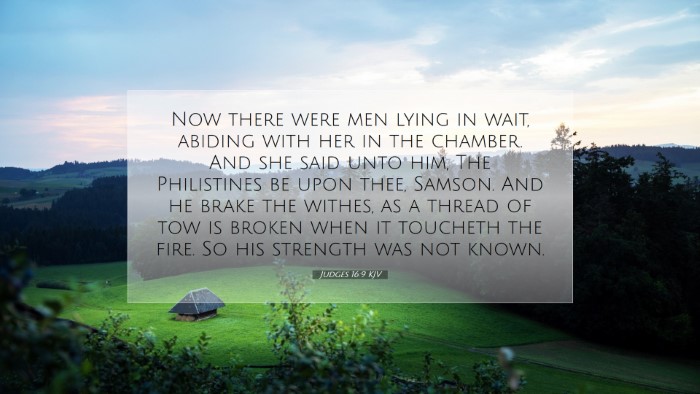Commentary on Judges 16:9
Judges 16:9 states: "Now there were men lying in wait, abiding with her in the chamber. And she said unto him, The Philistines be upon thee, Samson. And he brake the withes, as a thread of tow is broken when it toucheth the fire. So his strength was not known." This verse is pivotal in understanding the narrative of Samson and the continuing tension between Israel and the Philistines.
Contextual Overview
The Book of Judges documents a chaotic era in Israel's history where leaders arose momentarily to deliver Israel from oppression. Samson is one such leader, but his flaws and moral failings are as prominent as his physical strength. His relationship with Delilah serves as a critical moment revealing deeper lessons about weakness, temptation, and the consequences of straying from God’s purpose.
Insights from Matthew Henry
In his commentary, Matthew Henry emphasizes the contrast between God’s power and human frailty. He notes that while Samson’s strength is legendary, it is ultimately God’s spirit that empowers him. Delilah’s manipulation illustrates how easily one can be led astray by temptation. Henry critiques Samson for his foolishness in allowing himself to be compromised, remarking that his strength lies not merely in his physical capabilities but in his covenant with God.
Delilah’s Deception
Henry highlights that Delilah's role in the narrative is critical. She is not merely a seductress; she embodies the adversarial forces against Israel. Her insistence and deceit aimed at uncovering Samson’s secret reflect the continual pulls towards idolatry that Israel faced. Her actions raise questions about loyalty and betrayal and serve as a metaphor for any believer's susceptibility to external influences.
Albert Barnes' Perspective
Albert Barnes further elaborates on the circumstances surrounding this verse. He points out that the lying in wait represents the Philistines' strategic and persistent threat against Israel. Their focus on Samson indicates his significance as a judge. Barnes underscores the tactical cunning of the Philistines who exploited Delilah's relationship with Samson to gain an advantage over Israel.
The Breaking of Wires
He draws attention to the metaphor of the ‘wires’ and the strength that Samson possesses to break free from them, likening it to how faith can triumph over physical limitations. However, Barnes also notes a grave implication—the ease with which Samson betrays his own strength signifies a tragic self-sabotage, prompted by his desires. This incident serves as a cautionary tale of the dangers of compromising one's integrity and calling.
Adam Clarke's Commentary
Adam Clarke takes a more analytical approach, breaking down the text’s components and historical implications. He emphasizes the phrase "as a thread of tow is broken when it toucheth the fire," suggesting that the context of fire symbolizes temptation that can destroy one's defenses. Clarke interprets this as an allegory for how sin can penetrate and weaken even the strongest of individuals.
The Role of Divine Influence
Clarke also delves into the divine aspect of Samson's strength, highlighting the loss of this divine favor as Samson reveals his secret too late. His observations bring forth the idea that God’s support is conditional upon obedience. The moment Samson disregards this covenant, he is vulnerable to his enemies. Clarke’s insights lead to reflections on the themes of grace and the consequences of human action in relation to divine will.
Theological Reflections
The interaction between Delilah and Samson in Judges 16:9 prompts significant theological reflection. Each commentary underscores critical lessons on temptation, sin, and faithfulness. From Henry, Barnes, and Clarke, one can ascertain the following themes:
- Vigilance Against Temptation: Like Samson, believers must remain alert to the ways sin can infiltrate their lives, often through seemingly innocent relationships.
- The Importance of Accountability: Samson's failure to recognize his diminishing strength denotes the importance of accountability within spiritual communities.
- The Sovereignty of God: The commentaries collectively highlight God’s overarching plan and the importance of remaining in divine favor through obedience.
- The Consequences of Compromise: This incident serves as a stark warning against moral compromise, illustrating the rapid slide from strength to weakness.
Conclusion
Judges 16:9 encapsulates critical themes within the narrative of Samson, illustrating the conflict between divine strength and human frailty. Through the insights of respected commentators like Matthew Henry, Albert Barnes, and Adam Clarke, we gain a deeper understanding of the intricate connection between faith, temptation, and the peril of straying from God’s path. As pastors, students, theologians, and scholars reflect on this passage, they are reminded of the essential nature of vigilance in the face of temptation and the importance of sustaining one's covenant relationship with God.


